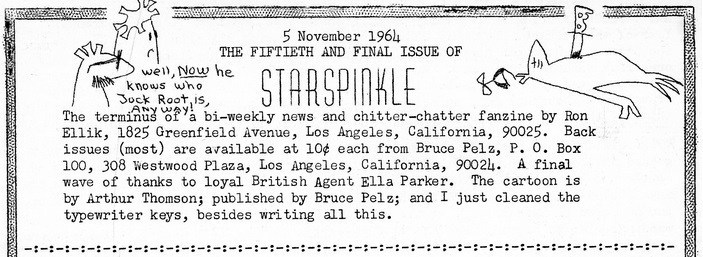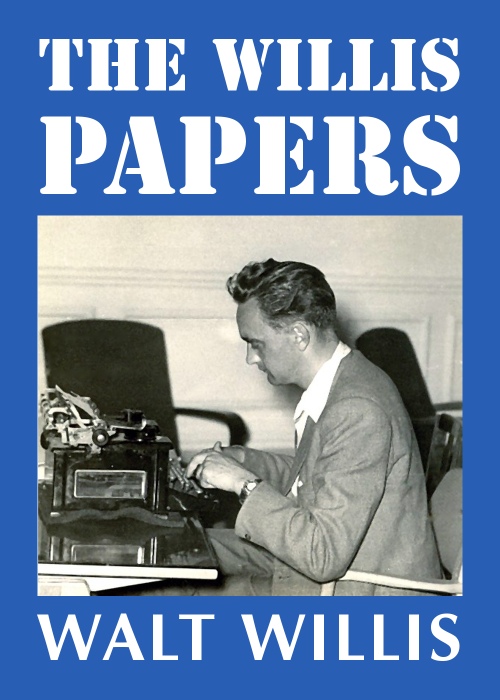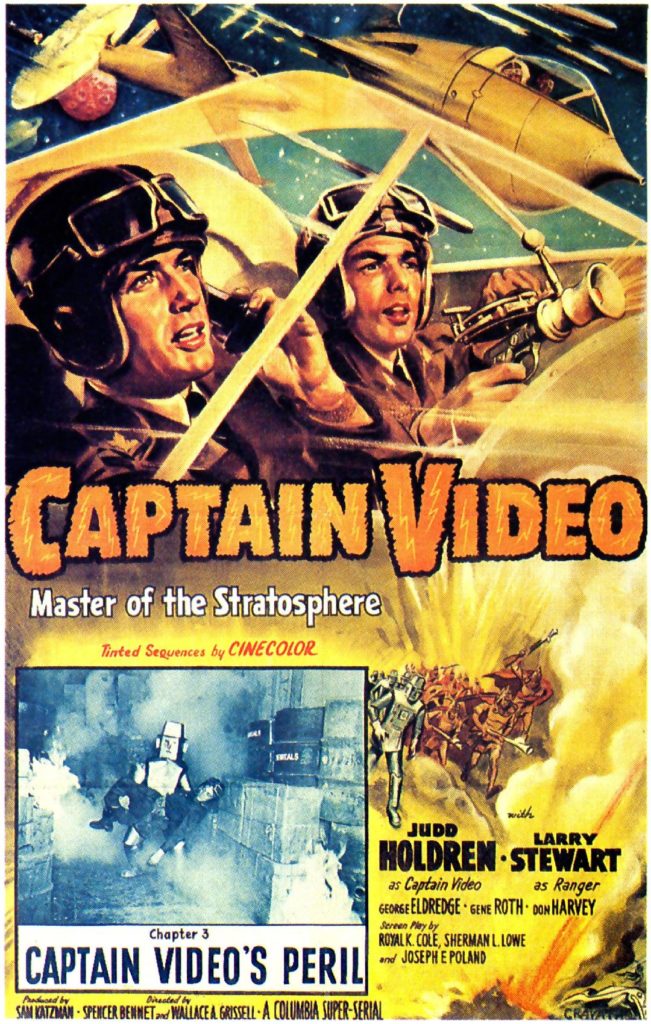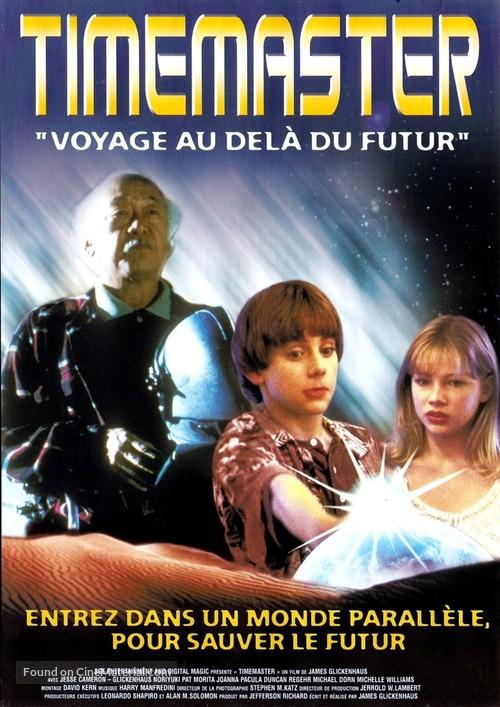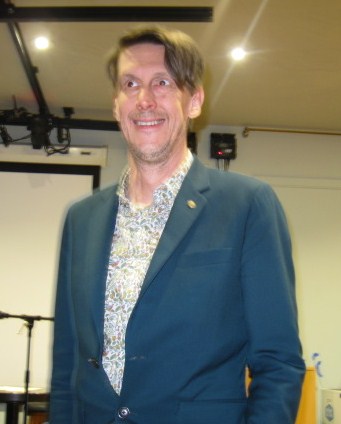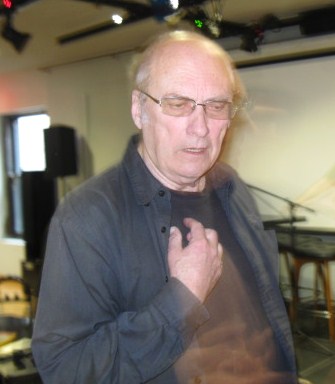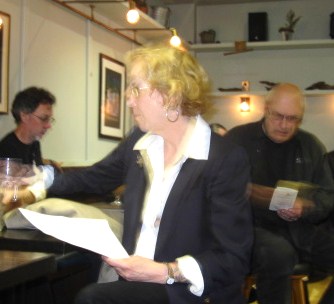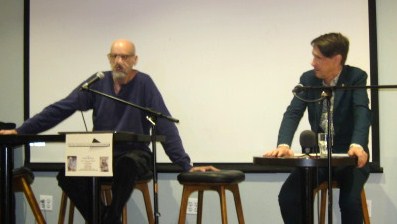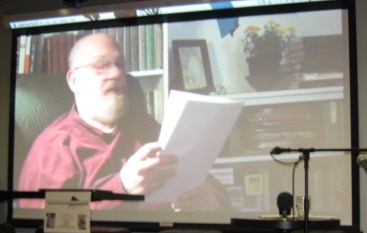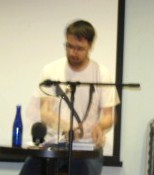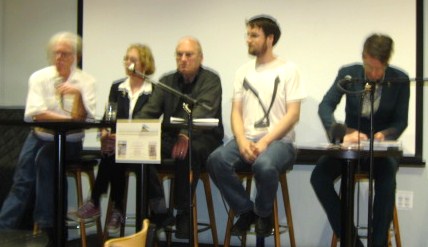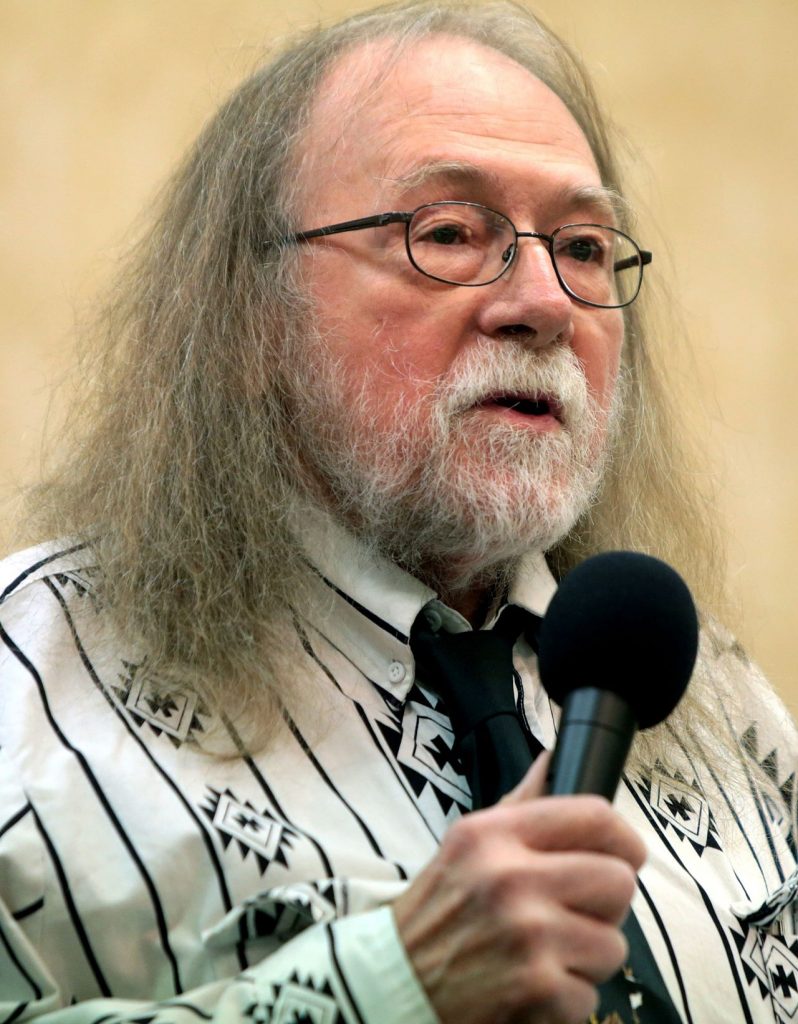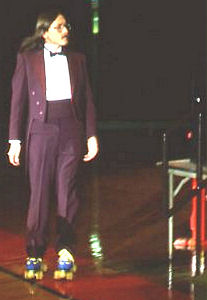(1) F&SF COVER REVEAL. The Magazine of Fantasy and Science Fiction’s Jan/Feb 2022 cover art by Kent Bash illustrates “Animale Dei Morti” by Nick DiChario. Publisher Gordon Van Gelder says the issue has just been printed and will be distributed soon.
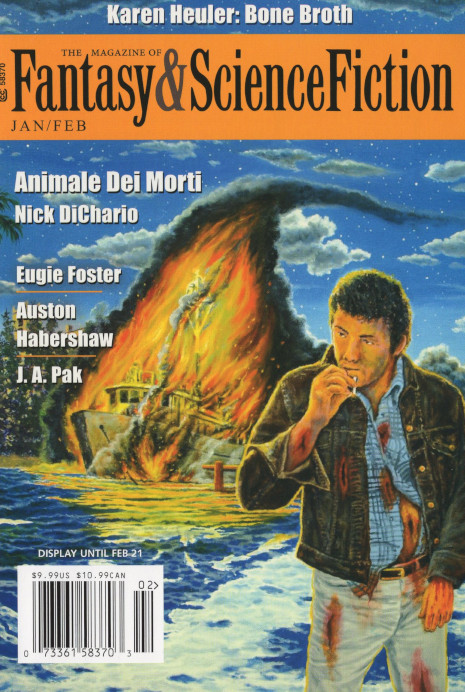
(2) PEN LONGLISTS. The 2022 PEN America Literary Awards Longlists announcement shows these titles are up for the Pen/E.O. Wilson Literary Science Writing Award ($10,000):
For a work that exemplifies literary excellence on the subject of the physical or biological sciences and communicates complex scientific concepts to a lay audience.
- The Memory Thief: And the Secrets Behind What We Remember — A Medical Mystery, Lauren Aguirre (Pegasus Books)
- This Is the Voice, John Colapinto (Simon & Schuster)
- Holding Back the River: The Struggle Against Nature on America’s Waterways, Tyler J. Kelley (Avid Reader Press)
- Extraterrestrial: The First Sign of Intelligent Life Beyond Earth, Avi Loeb (Mariner Books)
- The Disordered Cosmos: A Journey into Dark Matter, Spacetime, and Dreams Deferred, Chanda Prescod-Weinstein (Bold Type Books)
- Fox & I: An Uncommon Friendship, Catherine Raven (Spiegel & Grau)
- Second Nature: Scenes from a World Remade, Nathaniel Rich (MCD)
- Count Down: How Our Modern World is Threatening Sperm Counts, Altering Male and Female Reproductive Development, and Imperiling the Future of the Human Race, Shanna H. Swan (Scribner)
- Believers: Making a Life at the End of the World, Lisa Wells (Farrar, Straus and Giroux)
- Life’s Edge: The Search for What It Means to Be Alive, Carl Zimmer (Dutton Books)
The Judges are: Jonathan Safran Foer, Michele Harper, and Lauren Redniss.
(3) WILL THEY REWRITE THE SENTENCE? Updating a story being followed here because Courtney Milan said she’d been on the jury: “Trucker’s 110-year sentence in fatal Colorado crash to be reviewed after outcry” in the Sacramento Bee.
Following an outcry by millions of people, including Kim Kardashian, Colorado prosecutors have filed a motion seeking for a second look at the 110-year prison sentence of a trucker convicted in a fatal 2019 crash.
“As Colorado law required the imposition of the sentence in this case, the law also permits the Court to reconsider its sentence in an exceptional case involving unusual and extenuating circumstances,” the motion filed by the Colorado First Judicial District Attorney’s Office.
The motion says the court can review its sentence of Rogel Aguilera-Mederos based on new reports.
The move comes after more than 4.5 million people signed a Change.org petition asking Gov. Jared Polis to commute Aguilera-Mederos’ sentence….
(4) FRESH TRACKS. The Mary Sues have released a new album, Laser Printed Heroes. Hear all the tracks, including “A Thousand Lives” on Soundcloud. Band member Carol Dashiell – my daughter’s aunt! – told Facebook followers:
I’m super proud of this, it’s been a labor of love for a long time. Two of the songs are originals by Stu Venable (who also did our sound), plus some covers from various geeky properties, like Portal, The Witcher, Outlander, and others!
I’ve put the link the the comments so we don’t get throttled by Facebook, I hope you’ll check it out!
And if you like our album art, thank Sam Balcomb, who is a genius.
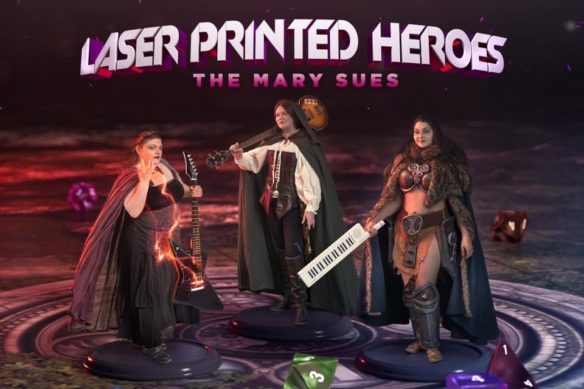
(5) REMEMBERING A FORGOTTEN CLASSIC. A new version of the original adventure game by Thomas M. Disch. Amnesia, a cult classic published by Electronic Arts 1986, is now available on the web for contemporary computers: AMNESIA : Restored.
Amnesia was envisioned as “bookware”—that is, a new kind of environment created specifically for the personal computer. Its two 5.25-inch floppy disks were packaged in a booklike folio that, when opened, resembled a newspaper with the author’s bio and game information presented as news about NYC. The game was also bundled with a 18-page manual, a command summary, map of Manhattan, x-street indexer, registration mailer, and newsletter subscription postcard.
When writing AMNESIA, Disch, an accomplished novelist, experimented with storytelling for the, then, new electronic environment. His 400-page manuscript laid out a narrative game that offers players 10 different endings. One sees players living out their days on a sheep station in Australia with a wife and a house full of children. In another, players are found guilty of a crime they do not remember committing and are given the choice of committing suicide or facing a firing squad. In some cases, they are allowed to meet St. Peter and provide the correct information about their identity to enter heaven. Depending on players’ ability to solve the puzzle, they may never leave The Sunderland Hotel. But if they are persistent, they get to explore the streets and places of NYC in search of who they really are….
(6) DECLINE BUT NOT FALL. John Crowley writes about “Learning to live with my aging mind in “The Old Imperium” at Harper’s.
…In July 2016, after taking the battery of tests that constitutes a neuropsychological evaluation, I was diagnosed with mild cognitive impairment, or MCI. Some months before then, my wife, L., had begun to notice and point out to me some signs: wrong word choices or failures to come up with a common name began to happen more than occasionally. Then came instances of fumbled choices or misunderstandings in daily activities. Some of these incurred serious if momentary risks. L. was puzzled. I wasn’t in denial about these incidents; I was, though, in a state of disbelief. Each one could be dismissed as random; I could perceive no pattern; it seemed that my thought processes remained sound. I was also pestered by the sort of slips that unnerve the old and can seem comical to the young and the unimpaired—forgetting where the car is parked, opening the closet or refrigerator door and standing immobile, unable to remember what was wanted, often something not kept there. I was seventy-two years old, and it became clear that I needed help. My wise doctor—my primary care provider—found my symptoms as I described them doubtful as indications of impaired cognition, but agreed to prescribe a neuropsychological evaluation, to create a baseline against which future tests, if needed, could be compared…
He spends several paragraphs discussing what it was like to take the tests.
(7) DSC 60. DeepSouthCon 60 will be held in Huntsville, AL from October 21-23, 2022. Our Mike Kennedy and Sam Smith are co-chairs.
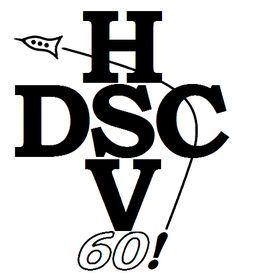
- Master of Ceremonies: Norman Cates, Co-Chair, 2020 New Zealand WorldCon, the first Virtual WorldCon
- Fan Guest of Honor: Bill Plott, who attended DSC 1, at David Hulan’s house, in Huntsville Alabama
Both Norman and Bill will be appearing in person.
(8) THE FLOW. Rich Horton reviews “A Newly Discovered Avram Davidson Novel: Beer! Beer! Beer!” for his blog, Strange at Ecbatan.
… In among Davidson’s papers there were some completely or nearly completed pieces — for instance an account of a trip to Belize — and at least one novel. This novel has now been published, by Seth Davis’ imprint Or All the Seas With Oysters Publishing. Seth was kind enough to send me a copy.
This novel is set in Yokums, NY, in 1930. (Yokums, of course, is a stand-in for Yonkers.) In one sense it is a fictionalized retelling of a locally famous incident: a sewer-cleaning crew encountered a mysterious rubber pipe — and from its open end beer came pouring out….
(9) RINGING IN THE MILLENNIUM. The New York Times traces “How ‘Lord of the Rings’ Became ‘Star Wars’ for Millennial Women”.
…For a certain subset of Millennial women, the “Lord of the Rings” film trilogy occupies the same role that “Star Wars” might for those who grew up from the late ’70s into the ’80s: It’s become a treasured part of the comfort-watch genre for women in their late 20s and 30s.
In the years after the films came out, rewatching them felt like a ritual only my sister and I observed. (My parents saw them with us in theaters, then never watched them again.) Through college, I met the occasional “Lord of the Rings” girl — a few friends in graduate school, and strangers on drunken nights out. And, of course, there were the memes and the accompanying meme accounts.
Then a few years ago, I began to notice the articles on The Cut and elsewhere. “What of the Boromir Woman?” “I’m Always Horny for Sauron.” “The Greatest Christmas Movie Is ‘The Lord of the Rings.’”
“We all loved ‘Lord of the Rings,’” said Gabriella Paiella, 32, a culture writer for GQ and former staff writer at The Cut. “That definitely did heighten my sense that there was a specifically female interest in these movies that I hadn’t necessarily thought of before because I think the world of ‘Lord of the Rings’ is sort of thought of as a nerdy male interest.”
“I was absolutely obsessed with reading gay hobbit erotica,” said one fan, Chelsea McCurdy.Chelsea McCurdy
Jokes and memes remained a fantastic way fans could bond, but Paiella and other women who came of age in the era of “Lord of the Rings,” say their passion for the movies is much deeper and more emotional. It’s an attachment that grew alongside the films’ most poignant, Howard Shore score-backed moments: “Don’t you know your Sam?” “I know your face” and “I would have followed you, my brother, my captain, my king.”…
(10) MEDIA BIRTHDAY.
1961 — [Item by Cat Eldridge.] Clown, hobo, ballet dancer, bagpiper, and an Army major – a collection of question marks. Five improbable entities stuck together into a pit of darkness. No logic, no reason, no explanation; just a prolonged nightmare in which fear, loneliness, and the unexplainable walk hand in hand through the shadows. In a moment, we’ll start collecting clues as to the whys, the whats, and the wheres. We will not end the nightmare, we’ll only explain it – because this is the Twilight Zone
Sixty years ago this evening, The Twilight Zone‘s “Five Characters In Search of an Exit” first aired on CBS. It was fourteenth episode of the third season. It was written of course by Rod Serling and directed by Lamont Johnson. It was based of Marvin Petal’s “The Depository” short story. The title, and the story itself, is a variation on Luigi Pirandello’s “Six Characters in Search of an Author” and Jean-Paul Sartre’s “No Exit” play. It’s far more entertaining than you’d think given the source material.
The premise is that uniformed Army major wakes up to find himself trapped inside in a large metal cylinder, where he meets a hobo, a ballet dancer, a bagpiper, and a clown. None of them have any memory of who they are or how they became trapped.
The cast here is William Windom, Murray Matheson, Susan Harrison, Kelton Garwood, and Clark Allen. The last shot of the episode, in which the five characters are seen in doll form, does not feature the actors; rather, specially made dolls were crafted that closely resembled the five actors who played the parts, and these are shown.
All of the Twilight Zone episodes are available on Paramount+.
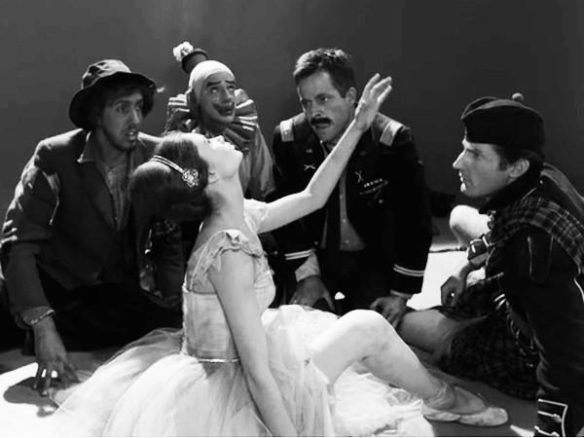
(11) TODAY’S BIRTHDAYS.
[Compiled by Cat Eldridge.]
- Born December 22, 1917 — Frankie Darro. What I’m most interested that it was he inside Robbie the Robot in Forbidden Planet. Other than showing up on Batman as a Newsman in two episodes, and The Addams Family as a Delivery Boy in one episode, I don’t think he had any other genre roles at all. Well, he was Lampwick, the boy who turns into a donkey in Pinocchio. That should count too. (Died 1976.)
- Born December 22, 1943 — Michael Summerton. One of the original Dalek operators, his work would show up in three First Doctor stories, “The Survivor”, “The Escape” and “The Ambush”. He’s interviewed for “The Creation of The Daleks” documentary which is included in the 2006 The Beginning DVD box set. According to his Telegraph obit, he was he was the last survivor of the original four operators of the Daleks. So, you don’t need to get past their paywall, here’s the Who part here: “After a lean period, he was excited to be offered a part in a new BBC science fiction series. His agent told him he would not need to learn any lines for the casting, and when he arrived at the BBC workshops he was asked to strip down to his underpants and sit in what appeared to be a tub on castors. Summerton (who was one of the four original Daleks) was instructed in how to move this apparatus about, the director saying: ‘We want to test this prototype for maneuverability. We want you to move forwards, backwards, sideways. Quickly, slowly.’ Presently the director lowered a lid over him with a plunger sticking out of it. Summerton found himself in total darkness. He would later relate: ‘When the lid went on I knew my career as an actor was over.’” (Died 2009.)
- Born December 22, 1954 — Hugh Quarshie, 67. First genre role was as Sunda Kastagirin in Highlander followed by being Detective Joyce in Clive Barker’s Nightbreed and Lieutenant Obutu In Wing Commander. He’s Captain Quarsh Panaka in Star Wars: Episode I – The Phantom Menace. He’s got a long tv history starting with playing Philostrate in A Midsummer Night’s Dream along with being Professor John Galt in the pilot for The Tomorrow People and Solomon in the Doctor Who episodes of “Daleks in Manhattan” and “Evolution of the Daleks”.
- Born December 22, 1951 — Tony Isabella, 70. Creator of DC’s Black Lightning Who is their first major African-American superhero. That alone is enough reason to include him in Birthdays. He also created Mercedes “Misty” Knight, an African-American superhero at Marvel Comics who’s played by Simone Missick in the various Netflix MCU series.
- Born December 22, 1951 — Charles de Lint, 70. I’ve personally known him for twenty-five years now and have quite a few of his signed Solstice chapbooks in my possession. Listing his fiction would take a full page or two as he’s been a very prolific fantasy writer, so let just list some of my favorite novels by him which would be Forests of The Heart, Someplace To Be Flying, Seven Wild Sisters and The Cats of Tanglewood Forest. You’ll find my favorite chapter from Forests of The Heart here.
- Born December 22, 1955 — David S. Goyer, 66. His screenwriting credits includes the Blade trilogy which I like despite their unevenness in storytelling, the Dark Knight trilogy, Dark City, Man of Steel, and its sequel Batman v Superman: Dawn of Justice (which is horrid). Let’s see what else is there? Well, there’s there’s Nick Fury film and two Ghost film which are all best forgotten… Oh he did The Crow: City of Angels. Ouch. Series wise, he’s been involved in FlashForward, Constantine, Da Vinci’s Demons which is a damn strange show, Krypton, Blade: The Series, Threshold, FreakyLinks and a series I’ve never heard of, Sleepwalkers.
- Born December 22, 1962 — Ralph Fiennes, 59. Perhaps best-known genre wise as Lord Voldemort in the Harry Potter film franchise, he’s also been M in the Bond films that just wrapped up starting with Skyfall. His first genre role was as Lenny Nero in Strange Days, one of my favorite SF films. He went on to play John Steed in that Avengers films. If you haven’t seen it, he voices Lord Victor Quartermaine in Wallace & Gromit: The Curse of the Were-Rabbit. Run now and see it!
- Born December 22, 1978 — George Mann, 43. Writer and editor. He’s edited a number of anthologies including the first three volumes of Solaris Book of New Science Fiction. Among my favorite books by him are his Newbury & Hobbes series, plus his excellent Doctor Who work. The Affinity Bridge, the first in Newbury & Hobbes series, was nominated for a Sidewise Award. The Revenant Express is his latest novel.
(12) COMICS SECTION.
- Rich Horton suggests Macanudo could be interpreted as evidence that maybe Chewbacca wasn’t along for the Kessel Run!
(13) A NEW BROOM SWEEPS CLEAN. [Item by Martin Morse Wooster.] In the Washington Post, Molly Roberts says that quidditch leagues are changing the name of the sport because of their views on J.K. Rowling’s comments on transgendered people and to avoid the trademark Warner Bros. has on “quidditch,” but they don’t know what the new name will be or how to attract people to the sport without a Harry Potter connection. “Quidditch’s new name might teach J.K. Rowling a surprising lesson”.
…US Quidditch and Major League Quidditch declared last week that they would change their names — partly because they believe ditching the trademark will allow the sport to expand, and partly because they believe ditching its inventor will avoid any nasty association with her public bigotry.
The move is meaningful and meaningless at the same time — and could show Rowling what she’s been missing all along. But let’s back up a second to help out those who can’t tell a bludger from a quaffle. (Ouch.)
Quidditch is the made-up sport of Rowling’s universe, in which witches and wizards fly around on brooms hurling some balls into hoops, hitting other balls with bats at other players, and trying to snatch one last little winged golden ball out of the air. Quidditch is also the real-life version of that sport, in which decidedly non-magical humans run around with brooms between their legs, hurling slightly deflated volleyballs into hoops and slightly deflated dodgeballs at opponents, and trying to snatch a tennis ball dangling in a sock from someone’s shorts….
(14) TOP TV. The New York Times television critics named “The Best TV Episodes of 2021”. They picked a number of episodes from genre programs – here are two examples.
‘Love, Death & Robots’ (Netflix)
‘The Drowned Giant’
In just 13 minutes, this elegant short about a giant’s corpse that washes up on a beach one day captures, in a perfect snapshot, humanity’s tendency to desecrate marvels, to behold a world-changing event and decide simply to carry on. Based on a short story by J.G. Ballard, “The Drowned Giant” is rendered here in mostly realistic animation, with the giant’s clean-shaven cheeks, tidy fingernails and muscular chest shown in aching detail. In an era when so many shows just blend together, this episode stands out for its light touch and sad imagination. (Streaming on Netflix.) MARGARET LYONS
‘What We Do in the Shadows’ (FX)
‘Casino’
“Shadows” is one of the funniest shows on TV right now, and “Casino,” where the gang heads to Atlantic City, was my favorite episode this season. Nandor (Kayvan Novak) becomes entranced by a “Big Bang Theory” slot machine — “‘bazinga’ is the war cry of Sheldon,” he explains — and in perfect, cascading horror, this leads to the total dissolution of his understanding of the universe. “Shadows” is its best when the vampires’ grandiosity clashes with their vulnerabilities, especially their excitability, and I’ll never see another in-house ad on a hotel TV without thinking that it’s Colin Robinson’s favorite show. (Streaming on Hulu.) MARGARET LYONS
(15) BEST BAD GUYS. In the Washington Post, Michael Cavna and David Betancourt dsicuss their six favorite Spider-Man villains, in a spoiler-filled article. “Top 6 Spider-Man movie villains ranked, from Electro to Green Goblin”.
[The latest film’s] Lizard, Rhino and Harry Osborn’s New Goblin, among others, can’t crack our list — keep trying, fellas. Here are our top six villains across this Spider-Man franchise’s eight live-action solo movies….
(16) AI: A FUTURE FOR HUMANS. BBC Radio 4 concludes the annual Reith Lectures series, “Stuart Russell – Living With Artificial Intelligence”, with the fourth and final episode now online here
Stuart Russell suggests a way forward for human control over super-powerful Artificial Intelligence. He argues for the abandonment of the current “standard model” of AI, proposing instead a new model based on three principles – chief among them the idea that machines should know that they don’t know what humans’ true objectives are.
Echoes of the new model are already found in phenomena as diverse as menus, market research, and democracy. Machines designed according to the new model would be, Russell suggests, deferential to humans, cautious and minimally invasive in their behaviour and, crucially, willing to be switched off. He will conclude by exploring further the consequences of success in AI for our future as a species.
Stuart Russell is Professor of Computer Science and founder of the Center for Human-Compatible Artificial Intelligence at the University of California, Berkeley.
(17) DRONES, GUNS, AND BOMBS THAT CALL THEIR OWN SHOTS. “Killer Robots Aren’t Science Fiction. A Push to Ban Them Is Growing” reports the New York Times.
It may have seemed like an obscure United Nations conclave, but a meeting this week in Geneva was followed intently by experts in artificial intelligence, military strategy, disarmament and humanitarian law.
The reason for the interest? Killer robots — drones, guns and bombs that decide on their own, with artificial brains, whether to attack and kill — and what should be done, if anything, to regulate or ban them.
Once the domain of science fiction films like the “Terminator” series and “RoboCop,” killer robots, more technically known as Lethal Autonomous Weapons Systems, have been invented and tested at an accelerated pace with little oversight. Some prototypes have even been used in actual conflicts.
The evolution of these machines is considered a potentially seismic event in warfare, akin to the invention of gunpowder and nuclear bombs.
This year, for the first time, a majority of the 125 nations that belong to an agreement called the Convention on Certain Conventional Weapons, or C.C.W., said they wanted curbs on killer robots. But they were opposed by members that are developing these weapons, most notably the United States and Russia.
The group’s conference concluded on Friday with only a vague statement about considering possible measures acceptable to all. The Campaign to Stop Killer Robots, a disarmament group, said the outcome fell “drastically short.”
(18) MAKE IT SO. Learn “How to Pronounce ‘Omicron’ the Star Trek Way”.
(19) A HOLE IN ONE. PBS Space Time host Matt O’Dowd asks “What Happens If A Black Hole Hits Earth?”
The possibility that a black hole could actually impact Earth may seem straight out of science fiction, but the reality is that microscopic primordial black holes could actually hit Earth. If one did, it wouldn’t just impact like an asteroid, it’d pass straight through the entire Earth and exit the other side. Perhaps craziest of all, this may have already happened!
[Thanks to Michael Toman, Cat Eldridge, Mike Kennedy, Rich Horton, Robert Brown, SF Concatenation’s Jonathan Cowie, Martin Morse Wooster, JJ, John King Tarpinian, and Andrew Porter for some of these stories. Title credit belongs to File 770 contributing editor of the day reheadedfemme.]

